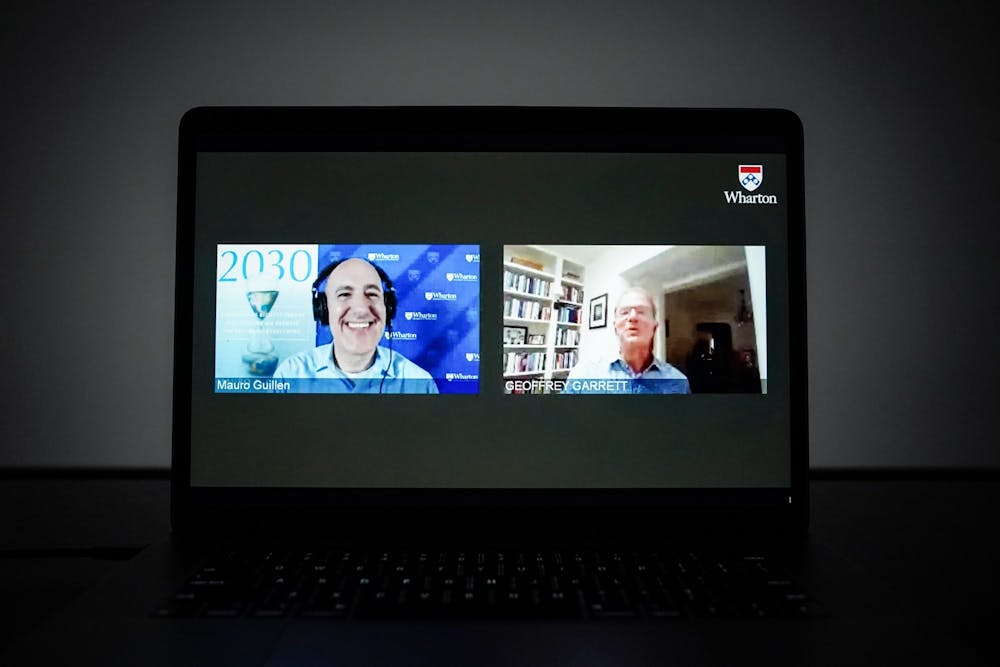After the end of this semester, the over 2,400 students and faculty who participated in Wharton’s six-week course on the COVID-19 pandemic largely agree it was an overwhelming success.
The course, entitled MGMT 198: Epidemics, Natural Disasters, and Geopolitics: Managing Global Business and Financial Uncertainty, was created by Wharton Management professor Mauro Guillén and featured 17 different lecturers throughout the semester's six three-hour long lectures.
Approximately 2,444 students — 1,944 for credit and around 500 auditors — participated in the online course, coming from all four undergraduate schools as well as many University graduate programs.
Guillén said he was pleasantly surprised by the high level of student participation, given the large class size and the class being virtual, and he believes it was a big reason why the class was such a success.
“There were more than 2,000 people that I’ve never met before, so I thought it was amazing that there was so much engagement,” Guillén said. “People felt that this was an opportunity to debate things with their friends, with other people, not just inside the class but outside, and it created a public sphere to discuss the issues.
Though the course was designated as a part of Wharton's curriculum, its subject matter was interdisciplinary. Lecture topics included behavioral concepts, such as emotional contagion and leadership in uncertain times, as well as the pandemic's economic impact on global markets and supply chains.
Guest lecturers included Penn President Amy Gutmann, National Bureau of Economic Research Fellow Kent Smetters, and Wharton Dean Geoffrey Garrett, among others.
Several students praised the breadth of topics discussed during the semester. Liza Ach, a rising second-year student in the accelerated Bachelor's of Science in Nursing program, saw the course as a unique opportunity to diversify her intense focus from the nursing education.
RELATED:
Gutmann criticizes U.S. for ‘striking lack’ of global leadership during coronavirus course
Wharton introduces six-week online course on coronavirus and global crisis management
“We tend to get kind of locked in to the nursing school, and obviously it’s because it's an accelerated program, so it was really great to have an interdisciplinary class and to be able to bring applied nursing knowledge to a class that was based at Wharton.”

MGMT 198 was created to help Penn students better understand the global impact of the coronavirus pandemic.
In addition to the material that was taught, Ach and rising Engineering sophomore Sharon Kuo both said one of the largest reasons they decided to enroll in the class was because they were able to learn about something that was applicable to current events.
“The pandemic is probably the biggest thing that I’ve lived through in my lifetime,” Kuo said. “It seemed like something that I really wanted to understand, and I knew it was going to reshape the world.”
2020 Wharton MBA graduate Sadia Dhorat also cited the timeliness of the course as a reason for enrolling, adding that she felt it was risky to solely rely upon the news as her primary source of information. She said the course enabled her to both develop a more thorough understanding of the pandemic, and inform her family in South Africa about specific ideas she learned from it.
Dhorat said that while the class was very interesting and useful, it was sometimes difficult to concentrate for the entirety of the three-hour lectures, especially since they were online.
“I think the challenges, which I’m sure were faced by many, were just: 'How do you maintain your focus for three hours? How do you stay as engaged when you’re staring at your screen for three hours once a week, and how do you make sure that you absorb everything that you can?'"
The University has yet to make a final decision regarding the format of the fall semester. Regardless of the decision, Guillén said he thinks similarly large, online courses should be offered in the future – even when students are on campus.
“For me, the biggest potential implication of this is that this is not just something that we had to do because we couldn’t be on campus,” Guillén said. “We can actually use this model in the future for bringing people together across campus. We don’t need an emergency.”
Garrett echoed Guillén, and said the fact no lecture hall on Penn's campus, even Irvine Auditorium which has a maximum capacity of 1,260, could fit everyone that took the course in the same space made it such a unique experience.
The live lectures took place on videoconferencing platform BlueJeans every Wednesday from 4:30 p.m. to 7:30 p.m. EDT. While the thousands of students could not speak during the lectures, they were able to interact with the professor in real time by submitting questions through the platform's question-and-answer feature.
For students who were unable to attend the live classes, lectures were recorded and available the next day. Outside of class, students were required to post a brief comment in a Canvas discussion thread each week, and complete a weekly quiz based on a selection of assigned readings.
While Garrett and Guillén were in favor of similar courses being offered in the future, both said they don’t believe an online education can replace in-person learning. Garrett realizes, however, that online courses offer some unique possibilities.
“While we all cherish, and we should [cherish], face-to-face, on-campus [instruction], you can just use technology to do things that are literally unachievable on campus.”









